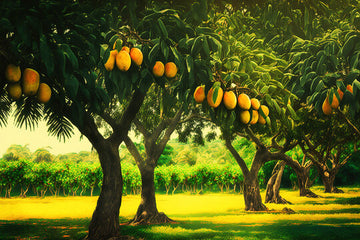
Sustainable agriculture has gained significant attention in recent years as the global community seeks to address environmental concerns, food security, and the economic well-being of farmers. One crop that stands out in this context is the mango, a tropical fruit that is beloved worldwide. Sustainable mango farming not only ensures a steady supply of this delicious fruit but also promotes environmental health and economic stability for farmers. This blog post delves into the practices and benefits of sustainable mango farming, highlighting why it is crucial for our future.
What is Sustainable Mango Farming?
Sustainable mango farming refers to the application of environmentally friendly practices in mango cultivation. This approach focuses on maintaining the health of the soil, conserving water, reducing the use of harmful chemicals, and promoting biodiversity. Sustainable farming practices aim to meet current agricultural needs without compromising the ability of future generations to meet theirs.
Key Practices in Sustainable Mango Farming
-
Organic Farming Techniques
- Natural Pest Control: Instead of relying on synthetic pesticides, sustainable mango farmers use natural predators and organic sprays to manage pests. This reduces chemical runoff and maintains ecological balance.
- Composting and Green Manure: Using organic waste materials to create compost helps enrich the soil with nutrients, improving its fertility and structure.
-
Water Conservation
- Drip Irrigation: This efficient irrigation method delivers water directly to the roots of the mango trees, reducing water waste and ensuring that the plants receive adequate moisture.
- Rainwater Harvesting: Collecting and storing rainwater for irrigation purposes helps reduce dependence on groundwater and municipal water supplies.
-
Agroforestry
- Integrating trees and shrubs into mango orchards can enhance biodiversity, improve soil structure, and provide additional income sources through the sale of timber and non-timber forest products.
-
Crop Rotation and Intercropping
- Rotating crops and planting different types of plants alongside mango trees can improve soil health, reduce pest and disease incidence, and increase farm biodiversity.
-
Soil Health Management
- Cover Crops: Growing cover crops helps prevent soil erosion, retain moisture, and add organic matter to the soil.
- Reduced Tillage: Minimizing soil disturbance helps maintain soil structure and microbial activity, which are crucial for plant health.
Benefits of Sustainable Mango Farming
-
Environmental Protection
- Sustainable practices reduce the environmental footprint of mango farming by minimizing chemical use, conserving water, and enhancing soil health. This leads to a healthier ecosystem and reduces pollution.
-
Economic Benefits
- Farmers who adopt sustainable practices often see long-term economic benefits. Organic mangoes, for example, can fetch higher market prices. Additionally, practices like agroforestry can diversify income sources, making farms more resilient to market fluctuations.
-
Improved Yield and Quality
- Healthy soil and efficient water use contribute to higher yields and better-quality mangoes. Consumers are increasingly looking for sustainably grown produce, which can open up new market opportunities.
-
Social Benefits
- Sustainable farming supports rural development by creating jobs and improving the livelihoods of farming communities. Training and knowledge sharing about sustainable practices can empower farmers and build stronger communities.
-
Climate Change Mitigation
- Practices such as carbon sequestration through agroforestry and reduced chemical use help mitigate climate change by lowering greenhouse gas emissions and increasing carbon storage in soils.
Sustainable mango farming is a vital approach to ensuring the long-term viability of mango production while protecting the environment and supporting farmers' livelihoods. By adopting practices such as organic farming, water conservation, agroforestry, crop rotation, and soil health management, farmers can produce high-quality mangoes sustainably. The benefits of these practices extend beyond the farm, contributing to a healthier planet and a more stable agricultural economy.
As consumers, supporting sustainably grown mangoes can drive demand for environmentally friendly farming practices. Together, we can help create a sustainable future for mango farming and enjoy delicious, responsibly grown fruit for generations to come.



